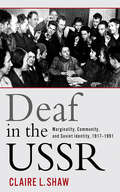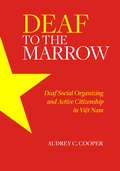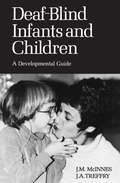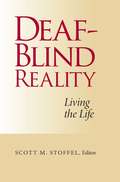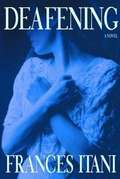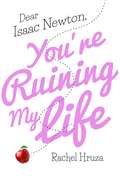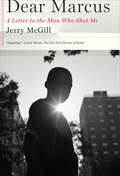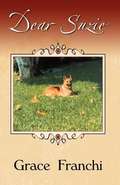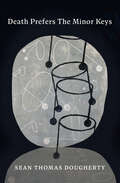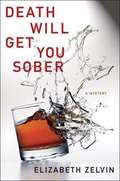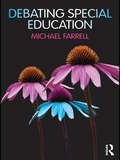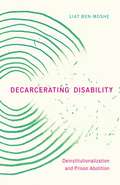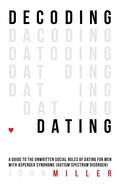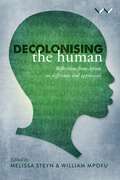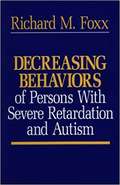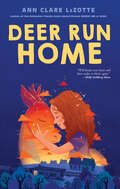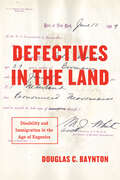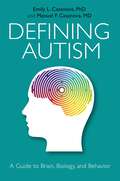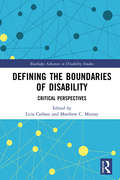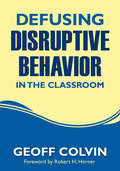- Table View
- List View
Deaf in the USSR: Marginality, Community, and Soviet Identity, 1917-1991
by Claire L. ShawIn Deaf in the USSR, Claire L. Shaw asks what it meant to be deaf in a culture that was founded on a radically utopian, socialist view of human perfectibility. Shaw reveals how fundamental contradictions inherent in the Soviet revolutionary project were negotiated—both individually and collectively— by a vibrant and independent community of deaf people who engaged in complex ways with Soviet ideology.Deaf in the USSR engages with a wide range of sources from both deaf and hearing perspectives—archival sources, films and literature, personal memoirs, and journalism—to build a multilayered history of deafness. This book will appeal to scholars of Soviet history and disability studies as well as those in the international deaf community who are interested in their collective heritage. Deaf in the USSR will also enjoy a broad readership among those who are interested in deafness and disability as a key to more inclusive understandings of being human and of language, society, politics, and power.
Deaf to the Marrow: Deaf Social Organizing and Active Citizenship in Viet Nam
by Audrey C. CooperIn Deaf to the Marrow, public anthropologist Audrey C. Cooper examines the social production and transformation of ideas about language, bodies, and state-structured educational institutions in southern Viet Nam. Focusing on the reform period (1986 to the present), Cooper describes the ways that signed-language practices, ideologies, policies, and programming shape and are shaped by Deaf people’s social engagement in and around Ho Chí Minh City. Drawing on research data and work with Vietnamese Deaf colleagues covering an eight-year span, Cooper develops ethnographic and language-centered accounts of Deaf social organizing. These accounts illuminate the ways that Deaf citizens are assuming self-determining roles, or active citizenship, in decisions of local, national, and international importance. By placing Deaf social action in the historical context of state development and modernization projects, Cooper shows how educational structuring reflects dominant, spoken-language-centered views of Vietnamese Deaf people and signed languages. She also addresses the impact of international aid agendas on education, especially those related to disability. Deaf to the Marrow examines perspectives largely ignored in Deaf education, Deaf studies, signed-language linguistics, and anthropological literatures, thereby contributing to scholarship on language and sociopolitical formation broadly and the study of Deaf people’s citizenship practices specifically.
Deaf-Blind Infants and Children
by John Mcinnes J. A. TreffryThis is a comprehensive reference guide for teachers, parents, and paraprofessionals working or living with children who are both deaf and blind. It provides day-to-day guidance and suggestions about techniques and methods for assessing children with multi-sensory deprivation, and for devising programs to help them cope.
Deaf-Blind Interpreting Workbook: Student Readings and Worksheets
by Mary Bauer Karen Chriest Stueland Jackie Engler-Morris Janie Neal Jelica Nuccio Cynthia WallaceThis workbook was put together to cover basic Deaf-Blind interpreting techniques. Over the past years, the Seattle Deaf-Blind Community has shaped this class and the workbook has evolved.
Deaf-Blind Reality: Living the Life
by Scott M. StoffelMost stories about disabled people are written for the sake of being inspirational. These stories tend to focus on some achievement, such as sports or academics, but rarely do they give a true and complete view of the challenges individuals must deal with on a daily basis. For example: How does a deaf-blind person interact with hearing-sighted people at a family reunion? How does she shop for groceries? What goes through his mind when he enters a classroom full of non-handicapped peers? These aren't questions you are likely to find answers to while reading that incredible tale of success. They are, however, issues that a deaf-blind person wishes others understood. Deaf-Blind Reality: Living the Life explores what life is really like for persons with a combination of vision and hearing loss, and in a few cases, other disabilities as well. Editor Scott M. Stoffel presents extensive interviews with 12 deaf-blind individuals, including himself, who live around the world, from Missouri to New Zealand, Louisiana to South Africa, and Ohio to England. These contributors each describe their families' reactions and the support they received; their experiences in school and entering adulthood; and how they coped with degeneration, ineffective treatments, and rehabilitation. Each discusses their personal education related to careers, relationships, and communication, including those with cochlear implants. Deaf-Blind Reality offers genuine understanding of the unspectacular but altogether daunting challenges of daily life for deaf-blind people.
Deafening
by Frances ItaniThis novel interweaves the lives of its two main characters - Grania, deaf since age five; and her husband Jim, who serves as a medic on the battlefields of World War I. The story begins with Grania's childhood in a small Canadian town, and her years at a residential school for the deaf. Her relationships within her family are portrayed with insight and depth. Jim leaves for Europe two weeks after his marriage to Grania, and much of the book involves his horrifying experience of the war. The author based Grania's character on her own grandmother, who was deaf, and has done extensive research on both deaf history and the social history of the World War I era. This is an absorbing novel and gives a refreshingly rounded depiction of a woman with a disability.
Dear Isaac Newton, You're Ruining My Life
by Rachel HruzaAs if seventh grade isn't hard enough, Truth Trendon learns she has to wear a back brace to help her worsening scoliosis. She decides gravity is to blame for curving her spine and ruining her life. Thanks for nothing, Isaac Newton!Truth's brace is hard plastic, tight, and uncomfortable. She has to wear a t-shirt under it and bulky clothes over it, making her feel both sweaty and unfashionable. She's terrified that her classmates are going to find out about it. But it's hard keeping it a secret (especially when gym class is involved), and secrets quickly turn into lies. When Truth's crush entrusts her with a big secret of his own, it leads to even more lying. Add to that a fight with her best friend, a looming school-wide presentation, and mean rumors, and it's a recipe for disaster. As Truth navigates the ups and downs of middle school, can she learn to accept her true self, curvy spine and all?
Dear Kilroy: A Dog to Guide Us
by Nora Vitz HarrisonFrom the Book Jacket: Dear Kilroy reminds us that some of the best teachers in this world have four legs and bark. Nora Vitz Harrison weaves the tender and wise humor of Kilroy and Riley, two canine correspondents, among heart-tugging essays on the magical relationship between people and dogs. The true-life stories follow a few special dogs and the human lives they change. The loss of a loved one or a relentless disease are made more bearable with a tail-wagging companion. Even if you have never been owned by a dog, you will be moved by this joyful yet bittersweet guide to life. NORA VITZ Harrison is a long time volunteer for Guide Dogs for the Blind and active in animal-welfare organizations. She has been a writer for corporate America since 1979. Her human-interest essays have appeared in The Oregonian newspaper and other publications. She lives in Oregon with her husband, Jon, and her dog, Riley. When she is not writing, she loves to hike, which is Riley's favorite hobby, too. Find out more about Nora and her canine friends at www.dearkilroy.com "The author of this lovely book is well aware of that spot deep within us that sometimes only dogs can find. The dogs in these stories touch that spot and make it glow." - Betty White actress/author 'As the dogs in Dear Kilroy strive to fulfill their potential, whether to become a guide for the blind or to become the best, most-trusted pet of someone in need, they inspire us to become better human beings. This book will lift your spirits and touch your soul." - Bob Phillips, CEO Guide Dogs for the Blind 'Harrison's delightful book reminds us that dogs serve as guides to the sighted as well as the blind. Open this book and your heart be opened, too." - Nancy Peterson The Humane Society of the United States
Dear Marcus: A Letter to the Man Who Shot Me
by Jerry McgillWhen Jerry McGill was growing up in the housing projects on the Lower East Side of Manhattan in the 1980s, his future seemed bright: Though times were tough for a family led by a single mother, McGill was a charming, precocious teenager, already excelling as an athlete and a dancer. But everything changed one night when he was thirteen. Walking home from a New Year's party with a friend, McGill was shot in the back by an unknown assailant, who was never caught. Soon after, he learned that he would be wheelchair-bound for life. Written as a letter to the man who shot him, whom he decides to call Marcus, Dear Marcus is a reflection on McGill's childhood, the event that changed his life in an instant, the challenges of living with a disability, and the importance of optimism, forgiveness, and making the most of our gifts. In this direct and intimate attempt to explain to his attacker the repercussions of his deeds--how one man's random decision radically altered the course of another's life--McGill takes us to the streets of New York City in the 1980s, to the hospital where he spent six months recovering, and on his journey to make the most of his new life. He recounts the joys he has experienced traveling the globe and mentoring disabled children, the love and support he has received over the years, and the strengths he has been able to find within himself that he may never have discovered had his life turned out differently. By turns brutally honest and funny, both full of rage and full of heart, Dear Marcus is an inspiring book about the moments in life that shape us--the ones that catch us by surprise, that blindside us, but that present us with opportunities for growth, reflection, compassion, and forgiveness. At some point--to greater or lesser degrees--we will all be in the wrong place at the wrong time. The challenge, though, as Dear Marcus shows us, is not to wallow in despair or blame other people, but to rise up and find strengths within ourselves that we didn't know we had.
Dear Suzie: The Sweet Love Story Between a Dog and her Beloved Human
by Grace FranchiThe story of a unique relationship between an exceptional guide dog and her human partner.
Death Knell (Duncan Maclain Mystery #5)
by Baynard KendrickWhen Troy Singleton is murdered on the Terrace of Larmar Jordan, Larmar is the prime and most obvious subject. But Duncan MacLain the famous blind detective is called in to figure out if Larmar is truly innocent. Come along on a thrilling novel from the perspective of the blind detective who can shoot at sound, and has a trained police dog Driest and a guide dog Schnucke. Can Duncan put the pieces of the puzzle together in time?
Death Prefers the Minor Keys
by Sean Thomas DoughertyIn his twentieth book, most of which was first composed on the backs of medical forms while on break as a third-shift medical technician, Sean Thomas Dougherty brings us a memoir-like prose sequence reflecting on disability, chronic illness, addiction, survival, love, and parenthood. In Death Prefers the Minor Keys, Dougherty offers the reader collaged prose poems, stories and essays full of dreams, metaphors, aphorisms, parables and narratives of his work as a caregiver. Moving portraits of Dougherty’s residents, a series of letters to Death, invocations of Jewish ancestry through the photography of Roman Vishniac, imaginary treatments for brain injuries, and half translated short stories of lives both real and imagined populate this collection. Through these, Dougherty engages issues of labor, the ontology of disability, and the mysticism of life. Death Prefers the Minor Keys is most of all a kind of love letter to Dougherty’s wife, and her courage and complicity in the face of long-term illness and addiction. Ultimately, we see how the antidote to despair can reside in daily acts of caring for other human beings.
Death Will Get You Sober
by Elizabeth ZelvinOn Christmas Day, Bruce Kohler wakes up in detox on the Bowery in New York City. He knows it's time to change his life, but how can he stay sober without dying of boredom? When homeless alcoholics start to die unexpectedly, Bruce is surprised to find he cares enough to want to find out why. Most of them had been down and out for many years, but Bruce's friend Guff was different: a cynical aristocrat with a trust fund and some secrets. Two old friends give Bruce a second chance and agree to help him with his investigation: his best friend, Jimmy, a computer genius and history buff who's been in AA for years, and Jimmy's girlfriend Barbara, a counselor who sometimes crosses the line between helping and codependency. Barbara works a night shift at the detox and confronts a counselor who might still be dealing drugs. Bruce gets a job temping for Guff's arrogant nephew. Between the three of them, suspects start piling up. The trail leads back to the detox. Or does it? In Death Will Get You Sober, Bruce discovers that the church basements of AA are a small world in the big city of New York.As he grapples with staying sober, he finds that not drinking is only the beginning of coming back to life--a life he finds he wants to keep when it's threatened by a killer. Debut author Elizabeth Zelvin has used her expertise as an addiction councilor to pen a riveting mystery filled with memorable, realistic characters who are as flawed as they are heroic.
Debating Special Education
by Michael FarrellDebating Special Education is a provocative yet timely book examining a range of criticisms made of special education in recent years. Michael Farrell analyses several key debates in special education giving balanced critical responses to inform policy and practice for the future of special education. The book identifies possible limitations to the current special education knowledge base and provision. Michael Farrell examines the value of labelling and classification, and asks if intelligence testing may have detrimental effects; and addresses a number of complex issues such as: how practitioners work within special education; and if, sometimes, professionals may be self-serving whether there is distinctive provision for different types of disabilities and disorders inclusion as mainstreaming offered as an alternative to special education, and the challenges this presents. The author's conclusion is that in responding to these challenges, special education demonstrates its continuing relevance and strength. Presenting a range of international, cross-disciplinary perspectives and debates – which are vital to an understanding of special education today, and written in Farrell's typically accessible style – this book will be relevant for teachers of special children in ordinary and special schools; those on teacher training courses and anyone whose work relates to special education.
Decarcerating Disability: Deinstitutionalization and Prison Abolition
by Liat Ben-MosheThis vital addition to carceral, prison, and disability studies draws important new links between deinstitutionalization and decarceration Prison abolition and decarceration are increasingly debated, but it is often without taking into account the largest exodus of people from carceral facilities in the twentieth century: the closure of disability institutions and psychiatric hospitals. Decarcerating Disability provides a much-needed corrective, combining a genealogy of deinstitutionalization with critiques of the current prison system.Liat Ben-Moshe provides groundbreaking case studies that show how abolition is not an unattainable goal but rather a reality, and how it plays out in different arenas of incarceration—antipsychiatry, the field of intellectual disabilities, and the fight against the prison-industrial complex. Ben-Moshe discusses a range of topics, including why deinstitutionalization is often wrongly blamed for the rise in incarceration; who resists decarceration and deinstitutionalization, and the coalitions opposing such resistance; and how understanding deinstitutionalization as a form of residential integration makes visible intersections with racial desegregation. By connecting deinstitutionalization with prison abolition, Decarcerating Disability also illuminates some of the limitations of disability rights and inclusion discourses, as well as tactics such as litigation, in securing freedom. Decarcerating Disability&’s rich analysis of lived experience, history, and culture helps to chart a way out of a failing system of incarceration.
Decoding Dating: A Guide to the Unwritten Social Rules of Dating for Men with Asperger Syndrome (Autism Spectrum Disorder)
by John MillerThe ultimate guide to cracking the social code of dating! The rules of dating are a conundrum for many men, but for men with Asperger Syndrome (Autism Spectrum Disorder) who often have difficulty understanding social communication, they can be almost indecipherable. This book methodically breaks down the steps of dating giving advice on the best places to meet women - whether on or offline, getting ready for the big date, where to go and what to talk about, and how to tell if a second date is on the cards. Written for those with little or no prior experience on the dating scene, the book discusses how to know if you are ready for a relationship, what qualities to look for in a potential girlfriend, and if dating goes well how to make a relationship work.
Decolonising the Human: Reflections from Africa on difference and oppression
by Melissa Steyn, William MpofuDecolonising the Human examines the ongoing project of constituting ‘the human’ in light of the durability of coloniality and the persistence of multiple oppressionsThe ‘human’ emerges as a deeply political category, historically constructed as a scarce existential resource. Once weaponised, it allows for the social, political and economic elevation of those who are centred within its magic circle, and the degradation, marginalisation and immiseration of those excluded as the different and inferior Other, the less than human. Speaking from Africa, a key site where the category of the human has been used throughout European modernity to control, exclude and deny equality of being, the contributors use decoloniality as a potent theoretical and philosophical tool, gesturing towards a liberated, pluriversal world where human difference will be recognised as a gift, not used to police the boundaries of the human. Here is a transdisciplinary critical exploration of a wide range of subjects, including history, politics, philosophy, sociology, anthropology and decolonial studies.
Decreasing Behaviors Of Persons With Severe Retardation And Autism
by Richard M. FoxxThis widely used manual shows how to increase desirable behaviors by using techniques such as shaping, prompting, fading, modeling, backward chaining, and graduated guidance. It offers specific guidelines for arranging and managing the learning environment as well as standards for evaluating and maintaining success. Exercises, review questions, and numerous examples are included. The book is written for special educators, aides, residential staff, and those responsible for designing or evaluating behavioral programs. Often adopted as a supplementary college text.
Deeper into the Soul: Beyond Dementia and Alzheimer's Toward Forgetfulness Care
by Bogna Szymkiewicz Nader Robert ShabahangiIn Deeper Into The Soul: Beyond Dementia and Alzheimer's Toward Forgetfulness Care, the authors invite us to shift our attitude toward dementia, or Forgetfulness, as they call it. Accompanying us are four characters -- a sage, a psychologist, a physician, and an intern -- who each see Forgetfulness from a different viewpoint. The goal is to develop a perspective which includes the basic ingredients of openness, curiosity, and acceptance.
Deer Run Home
by Ann Clare LeZotteEffie is Deaf, and no one in her family speaks sign language, her language. This moving story of survival and found family, inspired by a true court case, is perfect for fans of Wonder and Out of My Mind.* "Quietly extraordinary." -Kirkus Reviews, starred review* "Elegantly weaves a heartbreaking story with hope." -School Library Journal, starred reviewEffie and her older sister, Deja, have recently moved into their father's trailer after an incident at their mom's house. Daddy communicates with Effie by pointing, stomping on the floor, and making thoughtless jokes. Even if they did understand each other, could she tell the terrible secret she carries when telling feels impossible-and dangerous?But what if telling is the only way to be seen?This tender, spare, emotionally charged story about the impact of abuse and the power of love explores what it feels like to be an outsider in your own family and to awaken-through friendship, writing, and kinship with the natural world-to a new understanding and appreciation of yourself.
Defectives in the Land: Disability and Immigration in the Age of Eugenics
by Douglas C. BayntonImmigration history has largely focused on the restriction of immigrants by race and ethnicity, overlooking disability as a crucial factor in the crafting of the image of the "undesirable immigrant." Defectives in the Land, Douglas C. Baynton's groundbreaking new look at immigration and disability, aims to change this. In the late nineteenth and early twentieth centuries, Baynton explains, immigration restriction in the United States was primarily intended to keep people with disabilities--known as "defectives"--out of the country. The list of those included is long: the deaf, blind, epileptic, and mobility impaired; people with curved spines, hernias, flat or club feet, missing limbs, and short limbs; those unusually short or tall; people with intellectual or psychiatric disabilities; intersexuals; men of "poor physique" and men diagnosed with "feminism." Not only were disabled individuals excluded, but particular races and nationalities were also identified as undesirable based on their supposed susceptibility to mental, moral, and physical defects. In this transformative book, Baynton argues that early immigration laws were a cohesive whole--a decades-long effort to find an effective method of excluding people considered to be defective. This effort was one aspect of a national culture that was increasingly fixated on competition and efficiency, anxious about physical appearance and difference, and haunted by a fear of hereditary defect and the degeneration of the American race.
Defiant Children: A Clinician's Manual for Parent Training
by Russell A. BarkleyA sequence of procedures for training parents in child management skills that have been refined by Barkley's past 10 years of clinical work.
Defining Autism: A Guide to Brain, Biology, and Behavior
by Emily L. Casanova Manuel CasanovaOffering a summary of the current state of knowledge in autism research, Defining Autism looks at the different genetic, neurological and environmental causes of, and contributory factors to autism. It takes a wide-ranging view of developmental and genetic factors, and considers autism's relationship with other conditions such as epilepsy. Shedding light on the vast number of autism-related syndromes which are all too often denied adequate attention, it shows how, whilst autism refers to a single syndrome, it can be understood as many different conditions, with the common factors being biological, rather than behavioral.
Defining the Boundaries of Disability: Critical Perspectives (Routledge Advances in Disability Studies)
by Licia CarlsonThis ground-breaking volume considers what it means to make claims of disability membership in view of the robust Disability Rights movement, the rich areas of academic inquiry into disability, increased philosophical attention to the nature and significance of disability, a vibrant disability culture and disability arts movement, and advances in biomedical science and technology. By focusing on the statement, "We are all disabled", the book explores the following questions: What are the philosophical, political, and practical implications of making this claim? What conceptions of disability underlie it? When, if ever, is this claim justified, and when or why might it be problematic or harmful? What are the implications of claiming "we are all disabled" amidst this global COVID-19 pandemic? These critical reflections on the boundaries of disability include perspectives from the humanities, social sciences, law, and the arts. In exploring the boundaries of disability, and the ways in which these lines are drawn theoretically, legally, medically, socially, and culturally, the authors in this volume challenge particular conceptions of disability, expand the meaning and significance of the term, and consider the implications of claiming disability as an identity. It will be of interest to a broad audience, including disability scholars, advocates and activists, philosophers and historians of disability, moral theorists, clinicians, legal scholars, and artists.
Defusing Disruptive Behavior in the Classroom
by Geoffrey T. ColvinThe ultimate guide to handling problem behavior "in the heat of the moment"! When disruptive behavior occurs, your first response can determine how quickly the situation is resolved. Colvin offers teachers seven key behavioral principles and a range of research-based approaches for immediately defusing disruptive situations, avoiding escalation, and correcting behaviors. This resource features: Strategies that target specific behaviors, including off-task behavior, rule violations, disrespect, agitation, noncompliance, and threats and intimidation Common classroom scenarios and solutions for K–12 general and special education teachers Checklists and action plans for applying the strategies while maintaining the flow of instruction
